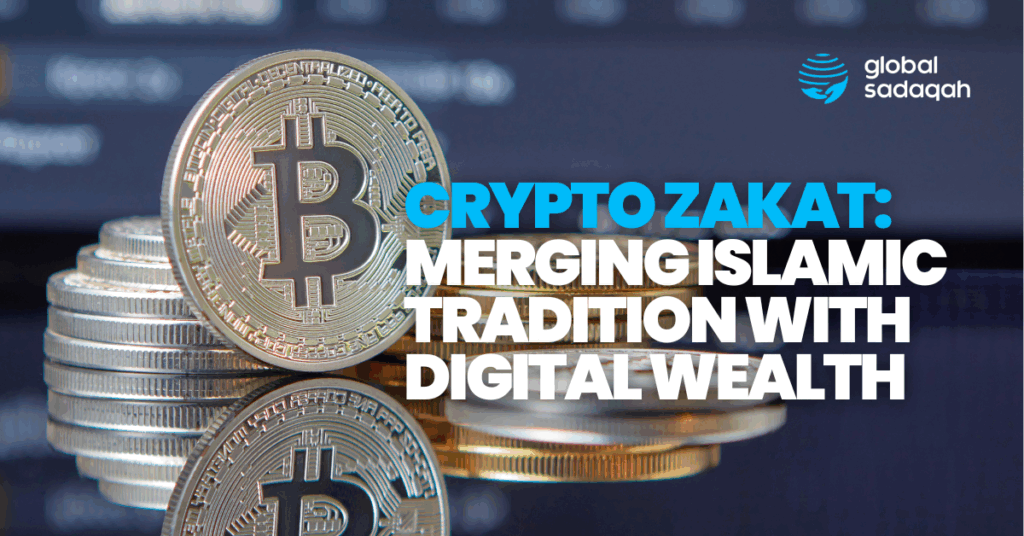Introduction
Zakat is more than just charity — it is one of the Five Pillars of Islam, a spiritual obligation that purifies wealth and uplifts communities. For over 1,400 years, Muslims have calculated zakat on assets such as gold, silver, livestock, and trade goods.
Today, wealth often exists in forms that classical scholars could never have imagined — cryptocurrency like Bitcoin, Ethereum, and stablecoins. With the rise of blockchain-based assets, many Muslims are asking: How does zakat apply to cryptocurrency, and how do we pay it correctly?
This guide explains the Islamic rulings, calculation methods, and payment options for crypto zakat — helping you bridge the gap between centuries-old tradition and modern financial innovation.
1. Understanding Zakat in Islam
Zakat comes from the Arabic word “زكاة” (zakāh), meaning purification and growth. It is a fixed proportion — typically 2.5% of qualifying wealth — that Muslims must give annually to eligible recipients.
The Qur’an emphasizes zakat alongside prayer as a fundamental act of faith:
“And establish prayer and give zakat, and whatever good you put forward for yourselves — you will find it with Allah.” (Qur’an 2:110)
Key principles of zakat:
- Nisab Threshold: The minimum wealth you must own before zakat becomes obligatory.
- Hawl Period: Wealth must be held for one lunar year before zakat is due.
- Eligible Assets: Gold, silver, cash, trade goods — and, by extension, digital assets that have monetary value.
2. Why Cryptocurrency is Subject to Zakat
Islamic finance principles classify wealth (mal) based on its ability to:
- Hold value
- Be owned and possessed
- Be traded or exchanged
- Generate profit
Cryptocurrency meets all these conditions. Whether you hold Bitcoin as a long-term investment or trade altcoins daily, your crypto holdings have monetary value and can be exchanged for goods or fiat money — making them zakatable.
Many scholars draw parallels between cryptocurrency and gold: both are limited in supply, mined, and valued globally, even though their form is different.
3. How to Calculate Zakat on Cryptocurrency
The zakat rate on crypto is the same as gold: 2.5% of total market value after one lunar year, if above nisab.
Step-by-step calculation:
- List all your crypto assets (Bitcoin, Ethereum, altcoins, stablecoins, NFTs with resale value).
- Check the market value on your zakat due date.
- Convert to your local currency using a reliable exchange rate.
- Compare to nisab — in gold terms, 85g gold × price per gram.
- Pay 2.5% of total value as zakat.
Example:
- You hold 0.3 BTC and 5 ETH.
- On zakat day:
- 0.3 BTC = $18,000
- 5 ETH = $9,000
- Total = $27,000
- Nisab (gold price at $60/g × 85g) = $5,100
- Zakat due = $27,000 × 0.025 = $675
4. Paying Zakat in Cryptocurrency
You can pay zakat on crypto in two main ways:
a) Convert to fiat currency
Sell enough crypto to cover your zakat amount and donate in local currency to a recognized charity.
b) Pay directly in crypto
Some Islamic charities now accept Bitcoin, Ethereum, and stablecoins directly. This is faster, avoids conversion fees, and supports global causes instantly.
Tips for paying zakat in crypto:
- Verify the recipient’s wallet address carefully.
- Keep transaction records for transparency.
- Use trusted platforms or reputable charities.
5. Common Mistakes to Avoid
- Forgetting DeFi and staking rewards: Income generated from staking or lending is zakatable.
- Ignoring short-term holdings: If crypto is in your possession on zakat day, it counts — even if you bought it recently.
- Using outdated prices: Always use market prices on your zakat calculation date.
- Not consolidating wallets: You must calculate zakat across all your wallets and exchanges.
6. Shariah Opinions on Crypto Zakat
General Consensus
- Crypto is wealth and zakatable if held for investment or trade.
- Zakat rate remains 2.5% annually.
- Volatile assets are valued at current market price, not purchase price.
Scholarly Views
- Supportive Scholars: See crypto as a legitimate asset like gold or foreign currency.
- Cautious Scholars: Acknowledge zakat obligation but warn about high volatility and speculation.
Most contemporary Islamic finance councils — including scholars from the UK, Malaysia, and the Middle East — agree that Muslims should pay zakat on cryptocurrency holdings.
7. FAQs on Crypto Zakat
Q1: Do I pay zakat on crypto I lost access to (lost keys)?
No. If you cannot access the asset, it is not in your possession and thus not zakatable.
Q2: What if my crypto value drops after I pay zakat?
Zakat is based on value at calculation date. Later fluctuations don’t affect the paid zakat.
Q3: Do I pay zakat on NFTs?
Only if they are held for trade or investment, not for personal use (e.g., art you simply enjoy).
Q4: Can I automate crypto zakat payments?
Some platforms allow recurring crypto donations, but you must still calculate your holdings annually.
Conclusion
Crypto zakat represents a powerful intersection between Islamic tradition and digital innovation. By giving 2.5% of your eligible crypto wealth, you fulfill a sacred duty while ensuring that the benefits of modern technology reach the less fortunate.
Whether you choose to donate in fiat or directly in crypto, the essence remains the same: wealth is a trust from Allah, and zakat ensures it circulates for the good of all.

